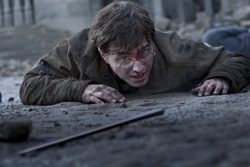
Ten years after the first film was released and fourteen years after the original novel was published, the Harry Potter saga comes to a close. In one of the strongest scenes in this final film, a character tells Harry about the importance of words and how things that exist only in the mind are as real as anything else. It’s a stirring tribute to the power of literature and the power of imagination, and it deserves to be found in the final film adaptation of one of the most beloved and successful series of novels ever written. As these novels have inspired people of all ages from all over the world to take up reading, even if this final film were a complete dud (and it’s far from it), the legacy that Harry Potter leaves behind is to be applauded.
Unsurprisingly this film picks up directly from where Harry Potter and the Deathly Hallows: Part 1 finishes. Harry (Daniel Radcliffe), Ron (Rupert Grint), and Hermione (Emma Watson) are trying to find the remaining horcruxes while Lord Voldemort (Ralph Fiennes) and his supporters grow in power. There’s an atmospheric stillness and quietness during the opening scenes to convey the feeling of our heroes being in the eye of the storm. An exciting sequence at the Wizarding Bank Gringotts soon kicks off the action, with the inclusion of an extremely impressive looking CGI dragon. The really big battle scene at Hogwarts occurs midway through the film leaving the later climatic scenes to focus on the more intimate and personal conflicts between the core characters. It’s all completely appropriate; we get the big spectacle but the film ends with the type of action that feels the most faithful to the rest of the series.

This is the fourth Harry Potter film by David Yates and while it still doesn’t hit the heights of the third and fourth film in the franchise, it is the best one of the last four. The previous three films felt at times like extended prologues for this one, but what it delivers considerably makes up for that. The rules of the Harry Potter universe are now established so no longer are there moments where bits of magic seem to be conveniently remembered or discovered at a moment of crisis. All the missing details concerning important backstories are skilfully woven into the main narrative and many of the supporting characters get an appropriate sense of closure along with the leads. It is especially wonderful to see the much derided character Neville Longbottom (Matthew Lewis) finally come into his own and Professor Minerva McGonagall (Maggie Smith) also gets a couple of great moments.
It was inevitable that this film was going to be quite moving considering the fate of various characters that we’ve all been with for a decade now. Nevertheless, Yates handles such moments well without losing momentum. The sight of the damaged Hogwarts buildings strongly evokes the look of the bombed out buildings throughout parts of England after World War II, touching on some of the Nazism imagery that found its way into Part 1. The epilogue may generate more unintentional laughs than intended, but it still possesses a very affectionate farewell to these now iconic characters. Casual fans of the film series will find this final outing extremely satisfying while the more serious fans are going to absolutely love it.
![]()

All of David Yates’ films are better cinematic instalments than Goblet of Fire. They are also on par with Azkaban. Yates is the best director this series has had.
Me2334, I completely agree. It frustrates me sometimes when critics honor Goblet of Fire with such prestiege when in fact the true magic lies in what both Cuaron and Yates were able to achieve in regards to film artistic integrity. Visually and emotionally, Yates and Cuaron made the most effective and poignant installments in the series. But, this is coming from someone who has studied film and the characteristics that make films artistic.
ah. the book definitely did the better ending. but what can compare to imagination. loved the film. loved the energy. hated the audience i saw it with … they were tragically unmoved and silent.
i feel a bit of loss at the moment. cinema revisit i think.